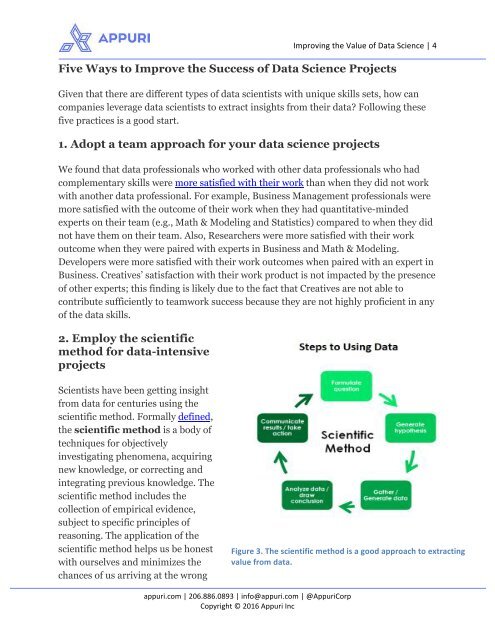Five Practices to Improve the Value of Data Science
five_practices_to_improve_the_value_of_data_science_-_full_report
five_practices_to_improve_the_value_of_data_science_-_full_report
You also want an ePaper? Increase the reach of your titles
YUMPU automatically turns print PDFs into web optimized ePapers that Google loves.
Improving <strong>the</strong> <strong>Value</strong> <strong>of</strong> <strong>Data</strong> <strong>Science</strong> | 4<br />
<strong>Five</strong> Ways <strong>to</strong> <strong>Improve</strong> <strong>the</strong> Success <strong>of</strong> <strong>Data</strong> <strong>Science</strong> Projects<br />
Given that <strong>the</strong>re are different types <strong>of</strong> data scientists with unique skills sets, how can<br />
companies leverage data scientists <strong>to</strong> extract insights from <strong>the</strong>ir data? Following <strong>the</strong>se<br />
five practices is a good start.<br />
1. Adopt a team approach for your data science projects<br />
We found that data pr<strong>of</strong>essionals who worked with o<strong>the</strong>r data pr<strong>of</strong>essionals who had<br />
complementary skills were more satisfied with <strong>the</strong>ir work than when <strong>the</strong>y did not work<br />
with ano<strong>the</strong>r data pr<strong>of</strong>essional. For example, Business Management pr<strong>of</strong>essionals were<br />
more satisfied with <strong>the</strong> outcome <strong>of</strong> <strong>the</strong>ir work when <strong>the</strong>y had quantitative-minded<br />
experts on <strong>the</strong>ir team (e.g., Math & Modeling and Statistics) compared <strong>to</strong> when <strong>the</strong>y did<br />
not have <strong>the</strong>m on <strong>the</strong>ir team. Also, Researchers were more satisfied with <strong>the</strong>ir work<br />
outcome when <strong>the</strong>y were paired with experts in Business and Math & Modeling.<br />
Developers were more satisfied with <strong>the</strong>ir work outcomes when paired with an expert in<br />
Business. Creatives’ satisfaction with <strong>the</strong>ir work product is not impacted by <strong>the</strong> presence<br />
<strong>of</strong> o<strong>the</strong>r experts; this finding is likely due <strong>to</strong> <strong>the</strong> fact that Creatives are not able <strong>to</strong><br />
contribute sufficiently <strong>to</strong> teamwork success because <strong>the</strong>y are not highly pr<strong>of</strong>icient in any<br />
<strong>of</strong> <strong>the</strong> data skills.<br />
2. Employ <strong>the</strong> scientific<br />
method for data-intensive<br />
projects<br />
Scientists have been getting insight<br />
from data for centuries using <strong>the</strong><br />
scientific method. Formally defined,<br />
<strong>the</strong> scientific method is a body <strong>of</strong><br />
techniques for objectively<br />
investigating phenomena, acquiring<br />
new knowledge, or correcting and<br />
integrating previous knowledge. The<br />
scientific method includes <strong>the</strong><br />
collection <strong>of</strong> empirical evidence,<br />
subject <strong>to</strong> specific principles <strong>of</strong><br />
reasoning. The application <strong>of</strong> <strong>the</strong><br />
scientific method helps us be honest<br />
with ourselves and minimizes <strong>the</strong><br />
chances <strong>of</strong> us arriving at <strong>the</strong> wrong<br />
Figure 3. The scientific method is a good approach <strong>to</strong> extracting<br />
value from data.<br />
appuri.com | 206.886.0893 | info@appuri.com | @AppuriCorp<br />
Copyright © 2016 Appuri Inc


